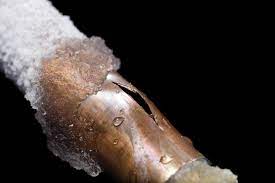We’ve been hit with extreme cold weather, and it doesn’t seem to want to quit. Temperatures below 0 degrees aren’t unusual for the Midwest (although the Omaha Metro area never dipped below 0 in 2023!), but this stretch of cold has been extreme.
 When temperatures fall below freezing, and stay as long as they have now, there is a real threat of pipes bursting, even in insulated, heated structures. Outdoor hoses, swimming pool plumbing, or sprinkler systems are at high risk, but pipes in unheated areas of your home such as basements, crawl spaces, attics, garages, and kitchen or bathroom cabinets are also susceptible to freezing. Pipes that run along exterior walls with little or no insulation are at the highest risk.
When temperatures fall below freezing, and stay as long as they have now, there is a real threat of pipes bursting, even in insulated, heated structures. Outdoor hoses, swimming pool plumbing, or sprinkler systems are at high risk, but pipes in unheated areas of your home such as basements, crawl spaces, attics, garages, and kitchen or bathroom cabinets are also susceptible to freezing. Pipes that run along exterior walls with little or no insulation are at the highest risk.
Older pipes, or those with rust or corrosion are weaker, and this increases the risk of freezing. Corroded pipes can split when freezing expansion occurs, and the damage occurs when they begin to thaw, or when water is turned back on. But even newer, plastic pipes can freeze in extreme conditions. The risk is even higher during a power outage, which is likely in areas of prolonged demands on the power systems.
 This can often go unseen until it is too late because pipes are typically inside walls. Homeowners may notice a leak after the water has damaged floors, ceilings, walls, or carpet.
This can often go unseen until it is too late because pipes are typically inside walls. Homeowners may notice a leak after the water has damaged floors, ceilings, walls, or carpet.
Draining exterior pipes completely of water is crucial. Insulating pipes in unheated areas with pipe sleeves or installing UL-listed heat tape will help prevent freezing. Plumbers recommend keeping a steady drip of water on to keep water moving through pipes. Keep kitchen and bathroom cabinet doors open to allow airflow, and if you will be away for some time, set the thermostat to at least 55 degrees.
If you suspect a pipe is frozen, but aren’t sure which one, turn on the faucets. If one isn’t releasing water, it is likely frozen. Turn the hot and cold water on, and begin thawing the pipes with a hairdryer, starting close to the faucet. Wrap the pipes in hot towels or electric heat tape or turn the heat in the home or building up to thaw the frozen pipes. Do not use a blowtorch, propane heater, or any open flame device to thaw pipes!
Unattended frozen pipes can lead to significant damage in your home. Contact the Prairie Construction team if you have questions about avoiding these types of problems in your home or structure. Stay warm and safe!